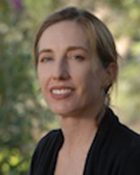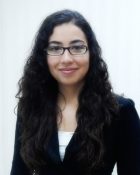
Pamela Hieronymi

Saraliza Anzaldua
Pamela Hieronymi's research sits at the intersection of many different subfields: ethics, philosophy of mind, philosophy of action, and moral responsibility and free will. She is currently working on a manuscript bringing her recent work to bear on the problems of free will and moral responsibility.
Pamela was interviewed by Saraliza Anzaldua. Saraliza, a first-year graduate student in the Department of Philosophy, is interested in teratology, the study of monstrosity, and questions like, "What does it mean to be human, and when does a human cease to be so?" She also studies Feminist Theory and Far East philosophy.
SA: When and how did you first become interested in Philosophy?
PH: My first encounter with philosophy was in junior high school and I was in the nerdy bus with my nerdy friends and my father, who was a philosophy major himself, gave me a copy of
Meditations on First Philosophy. And so my nerdy friends and I had an argument about whether we were being deceived by demons.
SA: How did you decide to pursue philosophy as a profession?
PH: As I was finishing my undergraduate degree, I was actually encouraged to pursue it by my professors, but I didn’t. I went to Washington D.C. and worked for a couple of years at a non-profit. But as I was working there, I realized that the things I most enjoyed were writing and doing research, and so at that point I decided to go back and pursue the degree.
SA: Are there any moments in your philosophical education that strike you as a turning point where you began to think about things differently or ask different sorts of questions?
PH: That is an interesting question. I’ll say that I was an undergraduate at Princeton, which is a program that values argument and argumentative structure. Each week, in our discussion sections, the TA would write on the board an argument from the week’s material-not in logical notation, but it could have been put in logical notation. And we would discuss the argument, week after week. That’s how I was trained as an undergraduate. And when I went to graduate school, I was at Harvard, and that’s a program that is not as interested in the arguments. It’s more interested in the underlying motivations and the bigger picture that’s animating the view, lying behind the arguments. So both of those are important to me and I think I benefited from each.
SA: What sort of research projects are you working on now?
PH: I am finishing up a short book on Peter Strawson’s “Freedom and Resentment.” It is a close read, an exegesis of that article, together with a final chapter that tries to defend what I claim is Strawson’s underlying view of the nature of morality. It is a surprising view, one that looks like it’s going to leave morality objectionably relativistic. So in the final chapter I try to defend it against the claim of relativism. That book is under contract, and it will hopefully be out next year. I am also finishing a much larger book on moral responsibility and free will. I’ll be giving a seminar on that manuscript in winter quarter. It is further from being wrapped up and done. But it’s a big project that’s the culmination of a lot of work I’ve been doing for basically my entire career.
The immodest ambition of the book is to unwind the traditional problem of free will and moral responsibility. I think the problem can be unwound, because I believe it is a philosophical one–that is to say, I believe the problem is created by certain philosophical pictures to which we are naturally (or culturally) prone. We model our experiences in certain ways, and we end up in paradox and difficulty. There are two pictures that I hope to replace. The first is what I will call the ordinary notion of control and the second is what I will call the merited consequences conception of responsibility. Both are natural, and fine for certain purposes, but together they lead to the traditional problem of free will and moral responsibility. The solution, I believe, is to do some remodeling: to revisit these models, understand what has gone wrong, and replace them with something better. That’s what the book aims to do. I think we can replace them with alternatives that are still natural models of our experience, but that are better-not only do they avoid the traditional problem, but I think they are actually more attractive pictures of shared human life.
Members of the Department want to see that there’s an argument, want to see what the argument is, but are not interested in argument, for argument’s sake. They also want to know why the argument is important–what’s driving it or what the motivation is.
SA: What do you like about being at UCLA? What is unique about the department and the culture here?
PH: I like the intellectual environment. Going back to my Princeton-Harvard contrast: this department values both argumentative rigor and paying attention to the underlying motivation. Members of the Department want to see that there’s an argument, want to see what the argument is, but are not interested in argument, for argument’s sake. They also want to know why the argument is important-what’s driving it or what the motivation is. I value that combination.
SA: Do you have any advice for undergraduates majoring in philosophy?
PH: Ours is a big major with a small faculty, so undergraduates should go out of their way to make connections with the faculty, and take advantage of any extra educational opportunities that are given. For example, in my classes I make it optional to turn in a draft. I think students definitely benefit if they turn in a draft and get feedback on that draft. Going to office hours is another additional opportunity that not everyone takes advantage of.
SA: What class at UCLA have you most enjoyed teaching?
PH: My free will class Philosophy 154B “Moral Responsibility and Free Will.” It’s the class I teach almost every year. I also enjoy teaching 22W “Introduction to Ethical Theory,” which is an intro class, though I find teaching the intro class is a bit more of a stretch for me, pedagogically. In the introductory classes, I have to remind myself not to rely on materials–on questions or puzzles or readings–that are only interesting if you already know how to do philosophy. Instead, I have to stay carefully, carefully focused on topics that are interesting even if you don’t know how to think philosophically, topics that will motivate students to want to learn how to think philosophically (like the Trolley Problem). And I find that challenging, though definitely worthwhile.
Still, the upper division class feels like a better fit for me, just because I can focus on the material I like the best-it’s material I will never get tired of.
SA: Outside of philosophy what do you like to do?
PH: I like to go rowing, I like to cook. I like to spend time with friends. My husband and I like to have parties.
SA: Are there any books in your area that you think would be interesting to a non-specialist?
PH: I almost always recommend Thomas Nagel’s
Mortal Questions to non-specialists.



